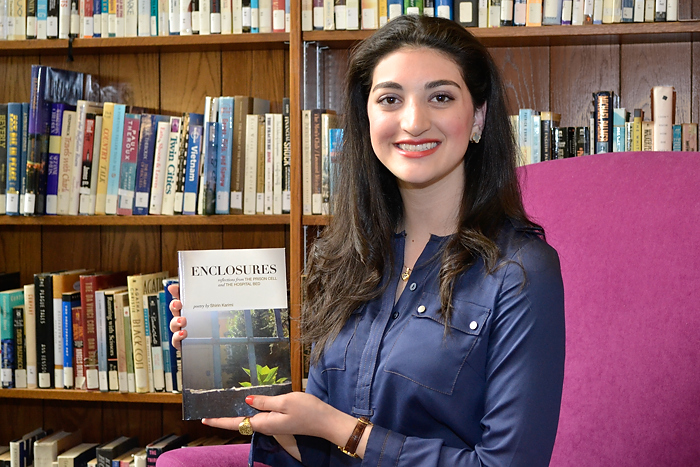
It’s not often that someone has the talent and perseverance to pursue both a career in medicine and literature.
But first-year UConn medical student Shirin Karimi has successfully bridged these two seemingly disparate branches of knowledge and is completing her first year of medical school while winning accolades for her writing.
A medical student’s day doesn’t allow for much free time, so Karimi wakes up early in the morning to make sure she has a chance to write. This tradition started when Karimi was a student at American University (AU) in Washington, D.C., where she received her undergraduate degree in literature and a minor in biology.
The Madison, Conn. native took several criminal justice courses while at AU where she was given in-class assignments about inmates sentenced to life in prison. She also spent time reading the creative works of prisoners.
During the summer, Karimi developed an interest in medicine while volunteering in the pediatric oncology clinic at the Lombardi Comprehensive Cancer Center at Georgetown University Medical Center. She read books written by physicians about their patients’ illnesses and became especially interested in the writings of Atul Gawande, a surgeon and writer for the New Yorker, and Christine Montross, a psychiatrist and professor who published a book called Body of Work: Meditations on Mortality from the Human Anatomy Lab.
The two experiences inspired her to write poems comparing illness and incarceration. “The comparison is about survival,” explains Karimi. “I try to bring out the intellect, fight, and strength through the words of people in the hospitals and prisons. Both places strip you of everything except the fundamentals of human relationships and values.”
Karimi’s favorite poem from Enclosures is “Seedlings,” which is inspired by a three-year-old girl with cancer. The poem is about everyone noticing that her hair was just starting to grow back after treatments and the beauty in those first few hairs.
Seedlings
I can see her garden.
Little seedlings
Sprouting from the shimmering surface of her head.
They are tiny,
So wispy,
One breeze could carry them far away
And she would be left with nothing again.
But no malicious wind, no malignant character dare touch her.
For beneath those gentle seedlings
Lies the strong, fertile soil,
A breeding ground that anchors the seeds deep
Never resigning, never relaxing its grip.
The soil is she
Resilience herself.
Her collection of poems was published into a book, Enclosures: Reflections from the Prison Cell and the Hospital Bed.
Karimi continues to write about her experiences in medicine, but she says her writing has changed since Enclosures. “Now I realize that for everything I have learned, there is still so much more to learn.”
Karimi says what she often writes about now is in response to the clinical work she has been doing and the interactions she has had with patients. Her topics have included the nervousness medical students experience when doing something for the first time (like touching a patient) and how they try not to show it; the challenge of comforting patients; and the breakdown of privacy and personal space that is necessary in order to help patients.
“Writing is more of a release than it was before,” she says. “Continually practicing the craft of writing helps me empathize. I try to write about the roles of different characters involved in the medical field, such as the patient, the family member, and the doctor. UConn has been very supportive of my writing.”
In fact, Karimi presented one of her newest selections during the Health Center’s most recent Schwartz Center Rounds, The Journey to Becoming a Physician: Student Reflections on Life, Disease and Dying. The piece she presented won the Geezer writing award for UConn. The judges for the award are retired Connecticut physicians.



